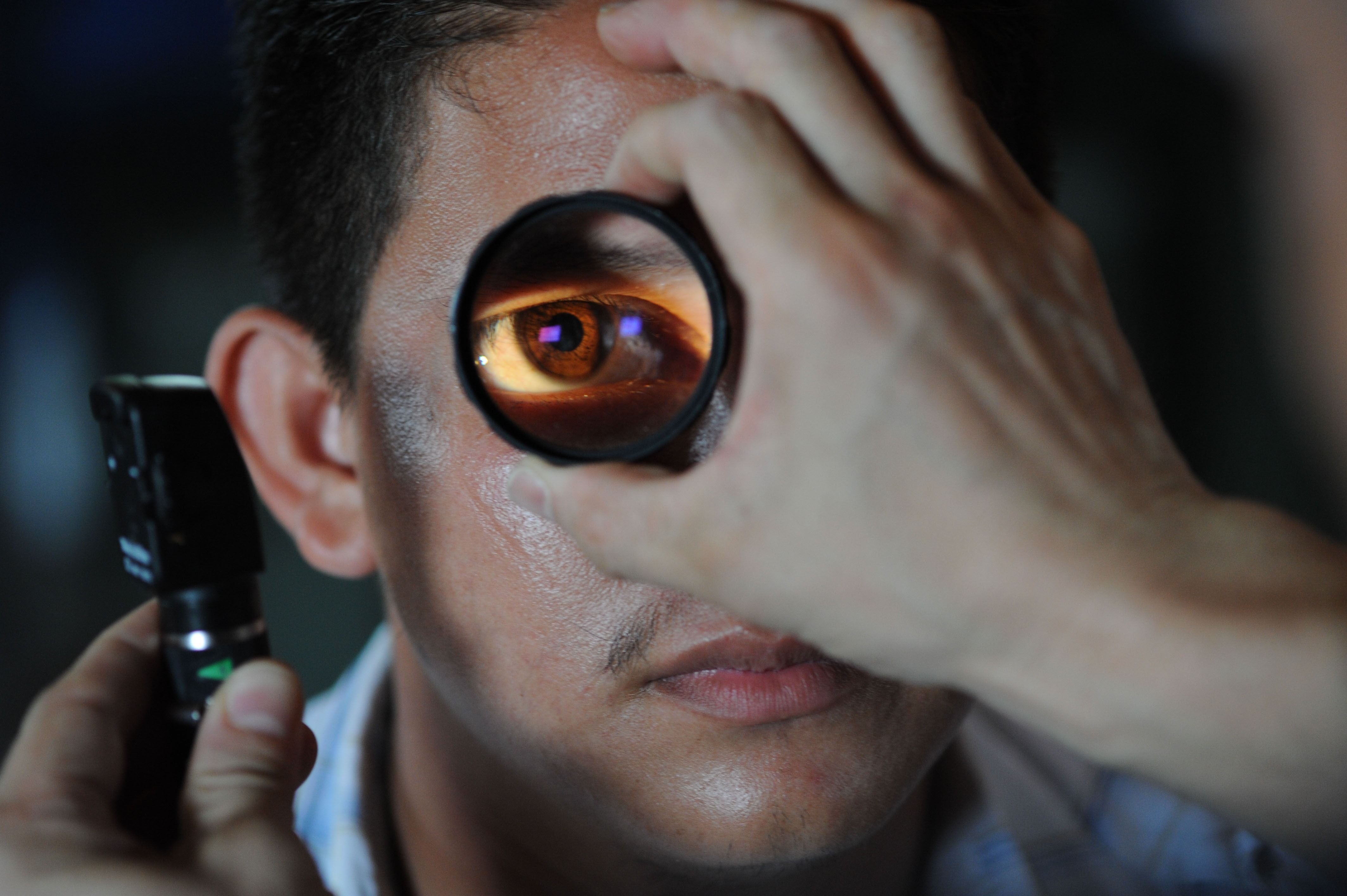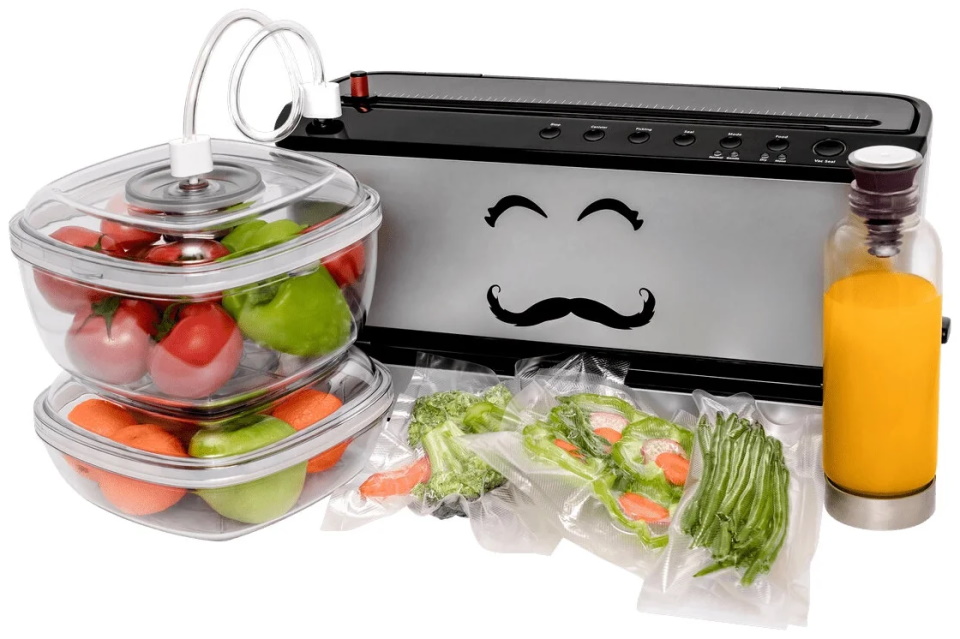Rating of the best seaweed for 2025
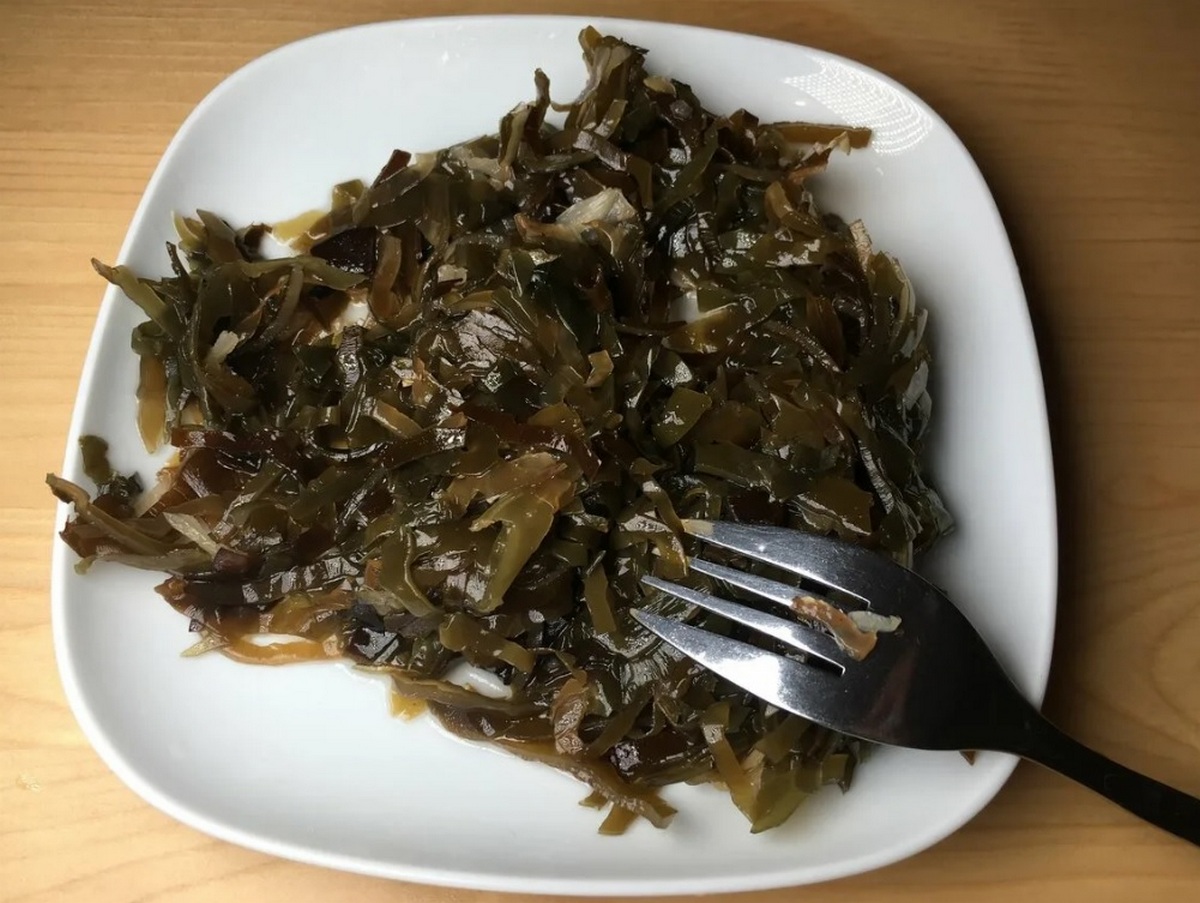
Seaweed (aka kelp) is not only a delicious seafood, but also an excellent tool for stabilizing the human intestinal tract. It can even be used as a mild laxative for constipation. Due to the rich content of nutrients (especially iodine), it can be successfully used in dietary nutrition, especially since it is simply impossible to gain excess weight from it.
Content [Hide]
The composition of kelp and the action of its components
It is particularly unique and includes: alginates, amino acids, polyunsaturated fatty acids, micro and macro elements, as well as various vitamins. If we take ordinary cabbage as a comparison, then sea cabbage contains twice as much phosphorus, iron - 16 times, sodium - 40 times and magnesium - 11 times. The energy value of the product in question is 350 kilocalories per 100 grams of the product, which contains only 0.5 grams of fat, 12 grams of proteins, and 70 grams of carbohydrates. After collecting kelp in the sea, it is subjected to drying and heat treatment, because it contains a lot of salt water. But even after drying, it becomes no less useful, because it only loses excess moisture, while retaining all useful trace elements and vitamins.
IMPORTANT! The frozen and shredded product also retains its useful properties, because the frozen briquette is stored at a temperature of -15 to -18 degrees Celsius.
More specifically, vitamins A, C, E contained in sea kale counteract the aging process, and vitamin D promotes the absorption of phosphorus and calcium. A group of vitamins B1 and B2 - normalize metabolic processes in the body, providing it with the necessary level of energy. B6 and PP are very important for the functioning of the nervous system, and they are also responsible for the normal condition of the skin, hair and nails. Micro and macro elements of sodium and potassium are responsible for maintaining the acid-base balance, and also stabilize the water balance. Calcium protects teeth and bones. Magnesium helps to overcome chronic fatigue and insomnia, while counteracting the development of osteoporosis, migraines, and cardiac arrhythmias. Iodine helps the activity of the thyroid gland and is responsible for the prevention of the development of hypothyroidism and even cretinism. Chlorine works together with sodium and calcium to regulate water-salt metabolism.
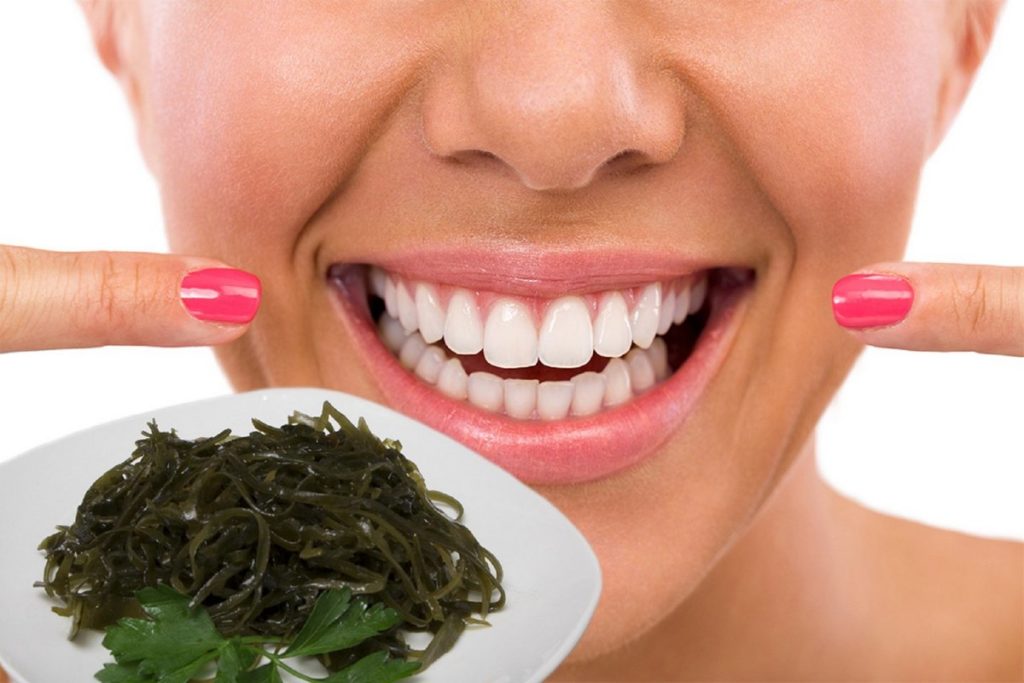
Useful properties of seaweed
- Iodine prophylaxis
One of its main components is iodine, which is essential for the normal functioning of the human thyroid gland. The first signs of its lack in the body are a feeling of weakness, a tendency to inactivity, impaired functioning of the heart muscle against the background of poor functioning of the kidneys and brain. Doctors have long found out that the human body requires an average of 130 micrograms of iodine per day. This dose is quite capable of providing kelp. Naturally, not all of its varieties may contain an increased concentration of iodine (which will depend on the place of growth), but 100 grams of the most common varieties of this product contain at least 400 micrograms of iodine. From this it is clear that even after eating 50 grams of algae, you can close the daily intake.
- Fighting high blood sugar
Seaweed contains alginic acid, which very well regulates the level of blood sugar saturation, which perfectly reduces the risk of developing diabetes. The product in question is extremely indicated for people with insulin resistance, when the cells of the body become insensitive to the hormones of insulin, therefore, the fucoxanthin contained in the algae helps to overcome this problem. Sugar is never added to dried seaweed, so a diabetic can even eat snacks and chips based on it. In pickled products, sugar is present, but in a very small amount.
- Prevention of gastrointestinal diseases
The beneficial substances contained in kelp have an excellent effect on the microflora of the human intestine, promoting the growth of healthy bacteria in the digestive tract. In addition, when using seaweed, polysaccharides are abundantly supplied to the bloodstream, which are responsible for improving the quality of the colon mucosa, while removing harmful microbes from it.
- Overweight control
Fiber in the composition of the product in question helps to get rid of hunger for a long time, prevents spontaneous overeating and allows you to feel quite comfortable for a long period of time. Fiber, on the other hand, will contribute to the fight against excess weight by reducing fat deposits, and the peptides in its composition normalize blood pressure.
- Prevention of heart disease
Elevated blood cholesterol can lead to dangerous heart problems. Laminaria will help reduce the risk of bad cholesterol, which will positively affect the work of both the heart and blood vessels.
- Fight against premature aging
This function in the product is performed by antioxidants that restore skin cells while strengthening the immune system. All this helps the body stay young and healthy longer.
Despite the large number of useful properties, there are contraindications for the use of seaweed. This product should not be used by persons:
- With advanced thyroid diseases;
- Having a personal intolerance to iodine;
- Having diseases of the digestive system;
- with progressive kidney disease.
Additives affecting the characteristics of seaweed
Most often, traditional ingredients in the form of vegetables, vegetable oil or spices are added to this product. The most ideal filling is mayonnaise or marinade sauces. If the cabbage is generally made only in the marinade (without any additives), then it will become the standard for a very low-calorie food. The stomach will spend exactly the same amount of energy on its digestion as it will receive from consumption. Also, it is worth mentioning that seaweed is allowed to be subjected to heat treatment. Most often, its canned variants are already a heat-treated product. If you correctly follow the cooking technology and withstand all temporary conditions, then the product can be provided with stable and long-term storage, which will practically not affect the presence of useful substances in its composition.
Release form
In retail chains, kelp is often sold in the following forms:
- Packaging in transparent containers;
- Canned food in glass or tin cans;
- Freezing in the form of briquettes;
- Products pressed onto thin plates;
- Dried product by weight.
It is worth noting that the product in question is never sold in fresh quality.The reason lies in the fact that after collection it must be subjected to heat treatment. This procedure is required to remove moisture from the stems and leaves, since they are mostly composed of it. And if you just dry them naturally, they will deteriorate very soon. At the end of the primary processing, sea kale goes through further stages of processing. There are many types of these algae in the world, but in the end result they will differ little from each other, all the more impossible to distinguish them by taste. The brightest taste will depend, first of all, on the additives with which the product is pickled or preserved.
Difficulties of choice
The most popular type of kelp, located on store shelves, are considered to be a variety of salads enclosed in airtight containers. Such products have both a bitter and salty taste. The iodine component gives bitterness to cabbage, and sea water is responsible for the salty taste. The maximum preservation of taste characteristics is observed only in dried and frozen cabbage. For pickled and canned varieties, the taste is largely determined by the spices and other ingredients used.
Signs of a quality product:
There are no foreign impurities and foreign particles in it (although the cabbage undergoes heat treatment on special nets, which filter foreign and inedible fragments, such a check before buying will not hurt once again);
- The packaging does not contain signs of deformation or damage;
- The plastic container in which the kelp is located should not be filled with condensate, bloom, or the internal filling should not have a “weathered” appearance (any of the above signs will indicate a low quality of the product);
- The color of the product in any form should look fresh, be distinguished by uniformity and saturation;
- If a variant of kelp is purchased in plates, then they should not stick together;
- A quality product should never look like a homogeneous mass;
- The amount of liquid in a container or jar should be kept to a minimum;
- Only unripe algae has a brown color - mature cabbage is always green;
- The aroma of the product must be specific. Simply put, the seaweed should smell like the sea;
- The entire mass must be absolutely clean, without any dirt.
Signs of a defective product:
- Before purchasing, pay attention to the expiration dates indicated on the package. The easiest way is to buy dry or frozen sea kale, and then cook it yourself. So the possibility of buying expired goods is almost zero.
- If vinegar was used as an ingredient, then it is better not to purchase such kelp (vinegar is specifically used to suppress odors and tastes of mold), but this does not apply to ready-made seaweed salads in a vacuum.
- You should definitely not buy a product on which you can visually observe traces of mold, unnatural plaque, and the leaves have too dark areas. All this speaks of the spoilage of the goods.
- The presence of a large amount of liquid or condensate in the jar also indicates the expiration date.
- Deformation (bloating) of cans with seaweed salad indicates its depravity.
- Adhesive kelp plates will indicate a violation of production technology.
- Frozen seaweed should not have particularly large pieces of ice, because this indicates a violation of the freezing technology.
IMPORTANT! The highest quality seaweed is harvested in the Barents and White Seas. Other options may have less expressive taste qualities, a less substantial composition of useful components. You can check the place of collection and production using the information that is necessarily placed on the package.
Quality checking
To assess the properties of kelp, you can pay attention to its following characteristics:
- Starch - it is an indicator of the amount of iodine in the composition of the product. In order to find out the level of this substance, you just need to pour a spoonful of starch on the cabbage. If the product is overdried, and there is little iodine in it, then the starch almost does not stain.
- The thickness of the plates - this indicator will indicate the maturity of the kelp leaves. Normal mature seaweed has sheets of sheets with a thickness of 1.5 to 2 millimeters. If this parameter is less, then the product was assembled immature.
- Brine - it characterizes the quality of canning more. Normal canned food should be filled with brine no more than a third. If there is more water, then the manufacturer simply saved on the nutrient mass.
Marketing tricks
These include the following dishonest methods:
- Soaking in salt - in this way, kelp is given a more beautiful appearance. Salt is able to give the leaves a bright green tint, but at the same time, the amount of useful vitamins immediately decreases in the composition;
- Non-GMO - such an inscription on the packaging simply does not make sense. Seaweed is rarely specially cultivated, preferring to harvest a natural crop.
- "Catchy" headlines (ex.“New taste!”) - in order to increase sales, some manufacturers are trying to diversify their assortment by adding some ingredients to the cabbage, which include vinegar, mayonnaise, spices. However, it is worth remembering that each added element lowers the useful properties of the main product. Also, do not trust only the main name of the product. For example, the name "Far Eastern seaweed" does not mean 100% the fact of the collection of products in this particular region. For more complete information, it is better to find out the location of the manufacturing plant.
Rating of Roskontrol
This organization is a non-governmental body, and should not be confused with Rospotrebnadzor. It is engaged in independent verification of the quality of goods and services on the territory of the Russian Federation. Under its auspices, it brings together leading scientific institutions and research laboratories, various associations and consumer protection societies. The main goal is to create a sphere of food security in the country and inform the population about the highest quality goods. As a rule, inspection of certain foodstuffs is carried out every three years. If we talk specifically about seaweed, then it is evaluated according to the following criteria:
- Salt content in the product;
- Mass fraction of iodine;
- Mass fraction directly of cabbage leaves:
- Taste qualities;
- The presence of third-party impurities, toxins and heavy metals.
Russian manufacturers underwent the first such test in 2017, and then the Morskoy Kotik and Dobroflot brands turned out to be the highest quality manufacturers. The last check was carried out in 2020, and then Dobroflot again remained the leader, but the brands Nautical Mile, Morskaya Raduga, Spetszakaz and 5 Seas also entered the top five.
Rating of the best seaweed for 2025
snack products
3rd place: Nori flakes dried, fried, with Kim's & Lee's family peppers
votes 0
This product of Korean origin is called "nori", comes in flakes, and tastes like hot peppers. Algae leaves are fried in fragrant sesame oil.
It is an excellent snack for rice and other dishes, as well as for beer. The product is rich in nutrients and trace elements. Consists of: corn and sesame oil, algae, sugar, roasted sesame, perilla oil, salt, monosodium glutamate. The recommended cost for retail chains is 59 rubles.

- Taste qualities are preserved in full;
- Useful properties are present;
- Inexpensive price.
- Contains food colorings.
2nd Place: "Sen Soy" Teriyaki Seaweed Nori Chips, 4.5g"
votes 0
The product is a harmonious combination of the rich taste of Teriyaki soy sauce and the specific taste of seaweed. Crispy nori plates fried in sesame and corn oil retain all the exceptional properties of seaweed, and soy sauce gives the chips a special bright taste. Ingredients: dried seaweed, corn oil, sesame oil, salt, soy sauce (water, soybeans, wheat, salt, sugar, pineapple, ginger, garlic). The recommended cost for retail chains is 82 rubles.

- The presence of natural spices;
- Rich taste;
- Good roast.
- Small volume and weight.
1st place: TENERA seaweed nori chips fried in sesame oil, 4 packs per block
votes 0
It is one of the most popular seaweed products. It differs in taste, its lightness and usefulness. It has a well-deserved popularity among all ages, on all continents, as it is one of the main agricultural exports of Korea. Now such snacks are produced in Russia, which makes them more accessible to consumers. The composition includes: seaweed of the genus Porphyra tenera, corn oil, rapeseed oil, sesame oil, table salt. The recommended cost for retail chains is 200 rubles.

- Large block volume;
- Adequate price;
- Quality production.
- The presence of palm oil in the composition.
Dried seaweed
3rd place: "MIEK Sea King, 150g"
votes 0
This product is focused more on the use and reception for medicinal purposes. Contains 0.23 gr. iodine, which ensures the production of thyroid hormones. The exceptionally high content of micro and macro elements (more than 40 in total) makes it indispensable in dietary nutrition. It is a prophylactic agent for thyroid diseases, oncology, atherosclerosis, diabetes mellitus. Promotes the release of radionuclides, cholesterol, salts of heavy metals from the body. In Korea, dried seaweed soup is traditionally always given to women in labor, since it is believed that the iodine contained in this seaweed helps to activate the metabolism of expectant mothers, and calcium, which is also rich in undaria, contributes to postpartum contraction of the uterus and stop intrauterine bleeding.The recommended cost for retail chains is 1193 rubles.
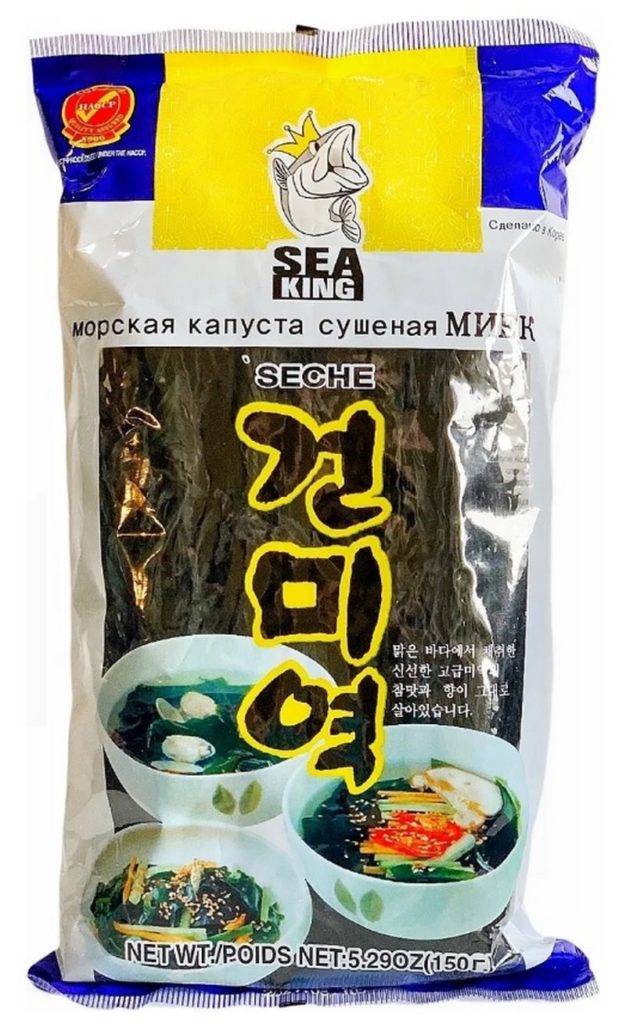
- Many healing effects;
- Good disease prevention;
- Sufficient pack size.
- High price.
2nd place: "PREMIUM" Natural drying "
votes 0
Product with only one ingredient. It goes well with a wide variety of products. A combination with fish will be natural. Delicious dishes are made from rice, meat, vegetables, mushrooms. From a dry product, a filling for pies is made. For cosmetic purposes, the dried product began to be used relatively recently. It can make the skin firmer and also get rid of cellulite. The appearance of salt on the surface of the product in the form of a white coating is allowed. The recommended cost for retail chains is 1500 rubles.
- Large volume of packaging - 1 kilogram;
- Universality of application (both food and cosmetology);
- Adequate value for money.
- Not detected.
1st Place: Maine Coast Sea Vegetables, Brown Algae, Wild Atlantic
votes 0
This is a very expensive commodity, which is associated with the difficulty of its extraction. Focused on medical applications (but not only). It is freeze-dried, has active enzymes, contains natural substances to enhance the taste and soften other proteins. Tested for the absence of chemicals, heavy metals, oil products, radiation and microbiological contamination. Conforms to all OCIA standards for sustainable collection and handling of this type of product. The collection takes place in a natural environment where brown algae are not subjected to heavy processing and retain all their mineral wealth.Ingredients: low temperature dried organic algae (Saccharina latissima). The recommended cost for retail chains is 3300 rubles.
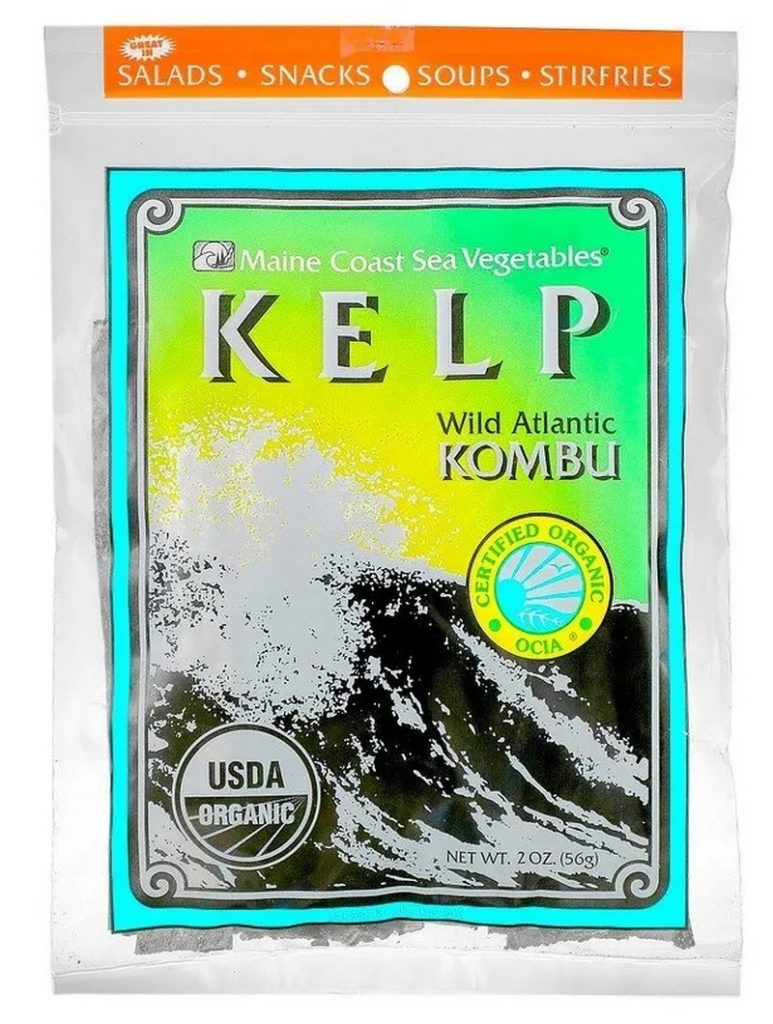
- Completely environmentally friendly product;
- Wide scope of use;
- Compliance with international quality categories.
- Very high price.
Canned products
3rd place: "Salad" Far East ", Fr. Sakhalin, Yantarnoye LLC
votes 0
This product is a storehouse of vitamins, trace elements and amino acids, it is also an excellent tool for cleansing the body of toxins. This lettuce has twice the phosphorus, 11 times the magnesium, 16 times the iron and 40 times the sodium as compared to the regular salad. It also contains polysaccharides, fructose, alginic acid, iodine, vitamins B1, B2, B12, D, A, E, ascorbic acid, potassium, fiber, micro and macro elements. In terms of its vitamin content, it surpasses many fruit and vegetable mixes. Thanks to special canning technologies, the products of Yantarnogo LLC retain their beneficial properties and natural taste. The recommended cost is 72 rubles.

- Innovative conservation technology;
- Preservation of the entire vitamin complex;
- Natural collection environment.
- Not detected.
2nd place: "Salad (Japanese shredded seaweed) with squid"
votes 0
Another sample of canned products, which is successfully supplemented with a protein component in the form of squid meat. During conservation, a high-quality technology for preserving useful substances was used. The products are exclusively for food consumption.The recommended cost for retail chains is 82 rubles.

- Safe type of preservation;
- Protein composition supplement;
- Reasonable price.
- Not detected.
1st place: Salad "Far East" (LLC "Dobroflot)"
votes 0
The nutritional value of this salad in 100 g of the product: proteins - 1 g, fat - 10 g, carbohydrates - 7.0 g, vitamins B1 - 0.01 mg, B2 - 0.01 mg, PP-6.5 mg , calorie content - 122 kcal. Shelf life: 24 months. The production complies with the technical conditions of the Russian Federation 10.20.34-148-33620410-2018. Ingredients: boiled seaweed, onion, vegetable oil, spicy-vinegar filling (water, sugar, black pepper, allspice, cinnamon, cloves, bay leaf, acetic acid), salt. The recommended cost for retail chains is 97 rubles.

- Balanced calories;
- A set of the best spices;
- Full compliance with TU RF.
- The presence of vinegar in the composition.
Conclusion
Doctors of ancient China and Japan called kelp sea ginseng for its ability to quickly restore the strength of a tired and weakened person. Scientists have also proven that with constant and prolonged consumption of seaweed, blood parameters significantly improve: the resulting sterols prevent its coagulability, the formation of blood clots and normalize the menstrual cycle in women.
new entries
Categories
Useful
Popular Articles
-

Top ranking of the best and cheapest scooters up to 50cc in 2025
Views: 131650 -

Rating of the best soundproofing materials for an apartment in 2025
Views: 127690 -

Rating of cheap analogues of expensive medicines for flu and colds for 2025
Views: 124518 -

The best men's sneakers in 2025
Views: 124033 -

The Best Complex Vitamins in 2025
Views: 121939 -

Top ranking of the best smartwatches 2025 - price-quality ratio
Views: 114979 -

The best paint for gray hair - top rating 2025
Views: 113394 -

Ranking of the best wood paints for interior work in 2025
Views: 110318 -

Rating of the best spinning reels in 2025
Views: 105328 -

Ranking of the best sex dolls for men for 2025
Views: 104365 -

Ranking of the best action cameras from China in 2025
Views: 102215 -

The most effective calcium preparations for adults and children in 2025
Views: 102011



